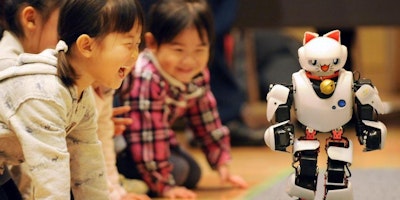How are AI Devices and Intelligent Toys Changing the Way Children Think and Behave?
How are AI Devices and Intelligent Toys Changing the Way Children Think and Behave? (with Randi Williams, MIT)
EVENT WEBSITE: http://bit.ly/t25kidsai
Goal of this Think Tank
"While adults envision the future of AI as focused on self-driving cars, personal assistants, and robot maids, children are more open to the imaginative possibilities. Their flexibility to see and interact with AI agents as entirely new entities is inspiring us to imagine and create novel forms of interaction." -- Randi Williams
The line between intelligent machines and living things is narrowing with each passing day and quicker than we can understand how it's changing us. But what about children? Toy manufacturers are struggling mightily to launch conversational AI devices for children amidst backlash from parents and advocacy groups: (1) When Your Kid Tries to Say 'Alexa' Before 'Mama' (2) Mattel Pulls Aristotle Children’s Device After Privacy Concerns (3) Mattel Delays kids' Voice Assistant Hello Barbie Hologram Until 2018
While the backlash against AI devices for children has focused primarily on privacy and data rights, the question that really begs to be answered is:
How might conversational AI assistants (like Amazon Echo) change how children define themselves, their world, and their relationships compared to prior generations, and what does this say about the world we're creating in the future?
JOIN US as we explore this question and compelling new research published by Stefania Druga and Randi Williams (MIT Media Lab) that studied how children engage with AI devices. Guest speaker, Randi Williams, will present their research and discuss the methodologies behind testing how children engage with conversational AI devices. Attendees will then participate in an interactive discussion and problem-solving exercises on how we might ideally design safe AI bots for children and how technology developers, toy manufacturers, parents, and teachers might prepare and protect children.
Hey Google, is it OK if I eat you?
The focus of this Think Tank is a recent research paper published by Stefania Druga and Randi Williams, Hey Google, is it OK if I eat you?: Initial Explorations in Child-Agent Interaction (June 2017).
Research Abstract:
"How do children perceive and interact with autonomous technologies that are becoming more embedded in their daily lives? To answer this question we studied how 26 children (3-10 years old) interacted with these autonomous technologies: Amazon Alexa, Google Home, Anki‘s Cozmo, and NDI Development‘s Julie Chatbot. In the context of this paper, we refer to them as “agents“. After interacting with these agents, children answered questions about trust, intelligence, social entity, personality, and engagement. We analyze children‘s interactions and responses and identify four themes: perceived intelligence, identity attribution, playfulness and understanding. In the discussion, we address how different modalities of interaction may change the way children perceive intelligence and understand the world around them. We also propose a series of design considerations for future child-agent interactions around voice and prosody, interactive engagement and facilitating understanding."
Long-term research objectives are motivated by the following questions: (1) How could exposure to, or interaction with, these smart bots affect children? (2) What are the short- and long-term cognitive and civic implications? (3) What design considerations could we propose to address the ethical concerns surrounding these issues?
About Randi Williams
 Randi Williams, Research Assistant, MIT Media Lab
Randi Williams, Research Assistant, MIT Media LabI am currently a Master's student at MIT. I am pursuing a PhD in Media, Arts, and Sciences with a concentration in Robotics and Human-Robot Interaction. I plan to use my research to develop assistive devices and collect behavioral information for well-being and educative applications. Ultimately, I aspire to be a researcher and an entrepreneur in the tech field.
My passions include learning, helping others learn, and exploring other cultures and the experiences that shape people into who they presently are. I have a strong passion for technology that started in 10th grade when I took my first computer programming class and I love reaching out to younger girls to share my passion for programming and engineering.
I have done internships at MIT Lincoln Laboratory, MIT's Media Lab, NASA Jet Propulsion Lab, and Jawbone. At MIT Lincoln Laboratory I worked in the Decision Support and Informatics Group doing video analytics through machine learning. At MIT's Media Lab I worked for the Fluid Interfaces group and developed web and mobile applications to help busy individuals automatically track key aspects of their day such as sleep, commute, movement, and location. I conducted research in the robotics department of NASA JPL as a Caltech Southern California Edison Company MURF Fellow. I worked at Jawbone as a CODE2040 Fellow in the Tools Team (web development).
At UMBC I was a part of UMBC's ECLIPSE research cluster under the mentorship of Dr. Nilanjan Banerjee. I also founded and led hackUMBC, an organization that brought hackathons to UMBC's campus.Twitter: @randi_c1 / LinkedIn: linkedin.com/in/randiwilliams
Location
Dates
to 11th January 2018 - 08:00 PM
